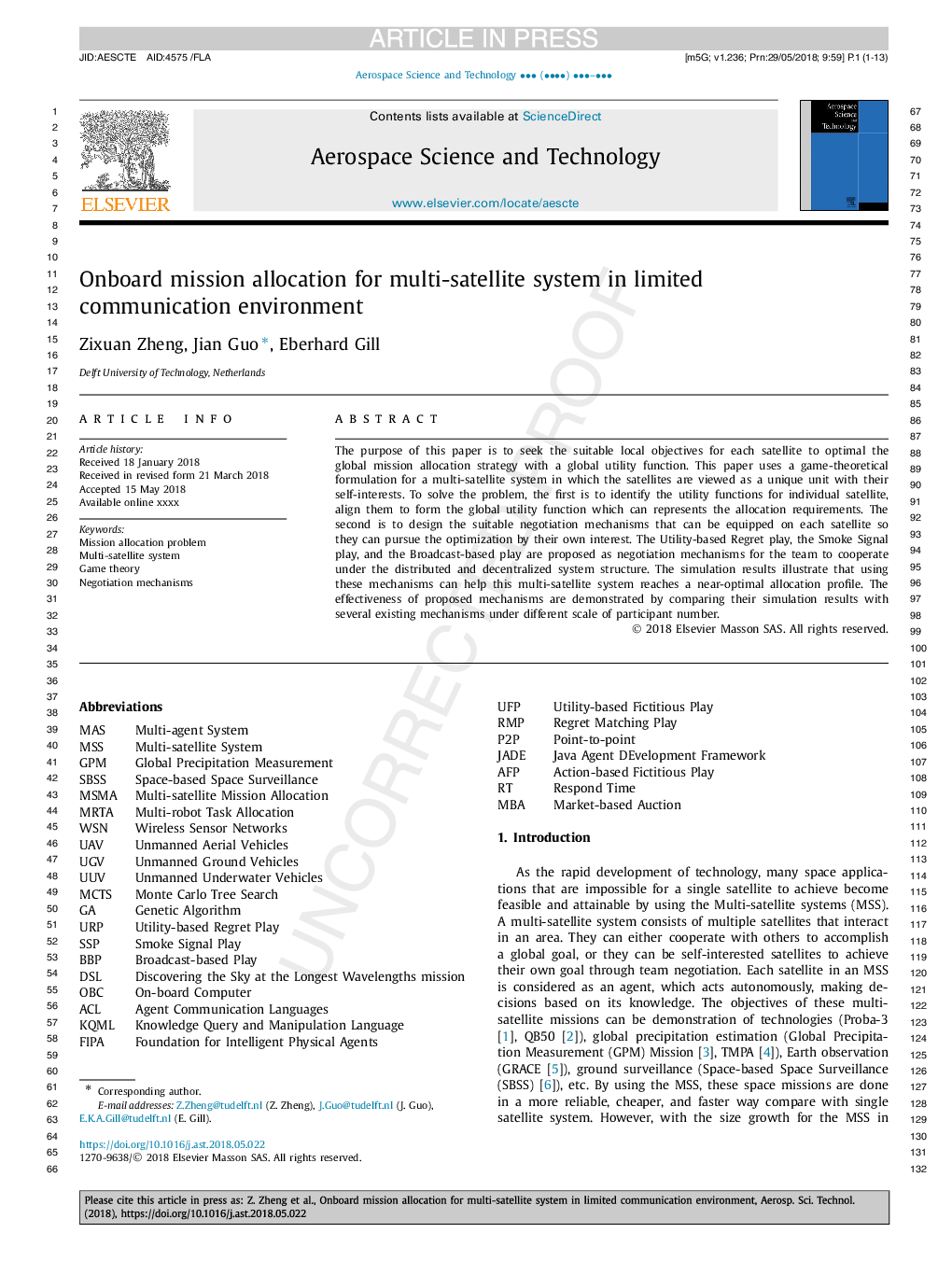| کد مقاله | کد نشریه | سال انتشار | مقاله انگلیسی | نسخه تمام متن |
|---|---|---|---|---|
| 8057349 | 1520055 | 2018 | 13 صفحه PDF | دانلود رایگان |
عنوان انگلیسی مقاله ISI
Onboard mission allocation for multi-satellite system in limited communication environment
ترجمه فارسی عنوان
تخصیص ماموریتی برای سیستم چند ماهواره ای در محیط ارتباطی محدود
دانلود مقاله + سفارش ترجمه
دانلود مقاله ISI انگلیسی
رایگان برای ایرانیان
کلمات کلیدی
مشکل تخصیص مأموریت سیستم چندرسانه ای، نظریه بازی، مکانیسم های مذاکره،
ترجمه چکیده
هدف از این مقاله یافتن اهداف مناسب محلی برای هر ماهواره برای بهینه سازی استراتژی تخصیص مأموریت جهانی با استفاده از تابع سود جهانی است. این مقاله از یک فرمول بازی-نظری برای یک سیستم چند ماهواره ای استفاده می کند که در آن ماهواره ها به عنوان یک واحد منحصر به فرد با منافع خود مشاهده می شوند. برای حل این مشکل، ابتدا توابع ابزار برای ماهواره های فردی را شناسایی می کنیم و آنها را به شکل تابع مفید جهانی می رسانیم که می تواند الزامات تخصیص را نشان دهد. دوم، طراحی مکانیسم های مذاکره مناسب است که می تواند بر روی هر ماهواره مجهز شود تا بتوانند بهینه سازی را با توجه به منافع خود دنبال کنند. بازی ناراحتی مبتنی بر سودمند، بازی سیگنال سیگنال و بازی مبتنی بر پخش به عنوان مکانیسم مذاکره برای همکاری در ساختار سیستم توزیع شده و غیرمتمرکز پیشنهاد شده است. نتایج شبیه سازی نشان می دهد که استفاده از این مکانیزم ها می تواند به این سیستم چند ماهواره کمک کند تا مشخصات تخصیص نزدیک به مطلوب را به دست آورد. اثربخشی مکانیسم های پیشنهاد شده با مقایسه نتایج شبیه سازی آنها با چند مکانیزم موجود در مقیاس های مختلف تعداد شرکت کنندگان نشان داده شده است.
موضوعات مرتبط
مهندسی و علوم پایه
سایر رشته های مهندسی
مهندسی هوافضا
چکیده انگلیسی
The purpose of this paper is to seek the suitable local objectives for each satellite to optimal the global mission allocation strategy with a global utility function. This paper uses a game-theoretical formulation for a multi-satellite system in which the satellites are viewed as a unique unit with their self-interests. To solve the problem, the first is to identify the utility functions for individual satellite, align them to form the global utility function which can represents the allocation requirements. The second is to design the suitable negotiation mechanisms that can be equipped on each satellite so they can pursue the optimization by their own interest. The Utility-based Regret play, the Smoke Signal play, and the Broadcast-based play are proposed as negotiation mechanisms for the team to cooperate under the distributed and decentralized system structure. The simulation results illustrate that using these mechanisms can help this multi-satellite system reaches a near-optimal allocation profile. The effectiveness of proposed mechanisms are demonstrated by comparing their simulation results with several existing mechanisms under different scale of participant number.
ناشر
Database: Elsevier - ScienceDirect (ساینس دایرکت)
Journal: Aerospace Science and Technology - Volume 79, August 2018, Pages 174-186
Journal: Aerospace Science and Technology - Volume 79, August 2018, Pages 174-186
نویسندگان
Zixuan Zheng, Jian Guo, Eberhard Gill,
